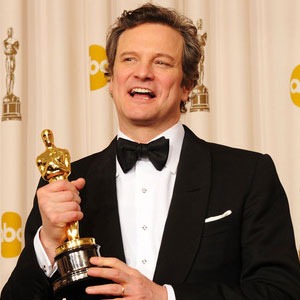 Jason Merritt/Getty Images
Jason Merritt/Getty ImagesJames Franco may have nothing on Colin Firth.
The Oscar winner has joked about being part of a triangle of man-love along with The King's Speech director Tom Hooper and costar Geoffrey Rush. But that might not be the only highly praised team he's been playing for.
There's a rumor buzzing in Britain that Firth was the driving force behind a recently published academic paper about the relationship between the brain and one's political leanings. Er, he may be the son of college lecturers, but hasn't Firth been rather busy lately, you know, winning a zillion awards and shooting new films like Tinker, Tailor, Soldier, Spy and Gambit?
Well, hang on to your gray matter, kids, because this random story is...
So true!
The Colin Firth is indeed credited as one of four authors of "Political Orientations Are Correlated With Brain Structure in Young Adults," published in the scientific journal Current Biology.
If you ask us, this is right up there with Bradley Cooper speaking French!
According to the BBC, the actor commissioned the research while serving as a guest editor on Radio 4's Today, a news and current affairs show that's been on the air since 1957.
Though really, it shouldn't come as a surprise that Firth's inquiring mind leaned in the direction of neuroscience. While his scholarly background is in music and, duh, the dramatic arts, he is also a published author and is active in various political and human rights causes, including Oxfam and Survival International.
Apparently, he just wanted to know if a liberal brain is distinguishable from a conservative brain! And, according to Firth and his partners in scientific advancement, they are!
"It is a useful contribution because it builds on and extends previous work," John Jost, an NYU professor in political psychology, told The Psychologist.
"It will probably be several years before we understand the full meaning of these results. In the meantime, the field of political neuroscience could do worse than having Colin Firth as a scientific ambassador."